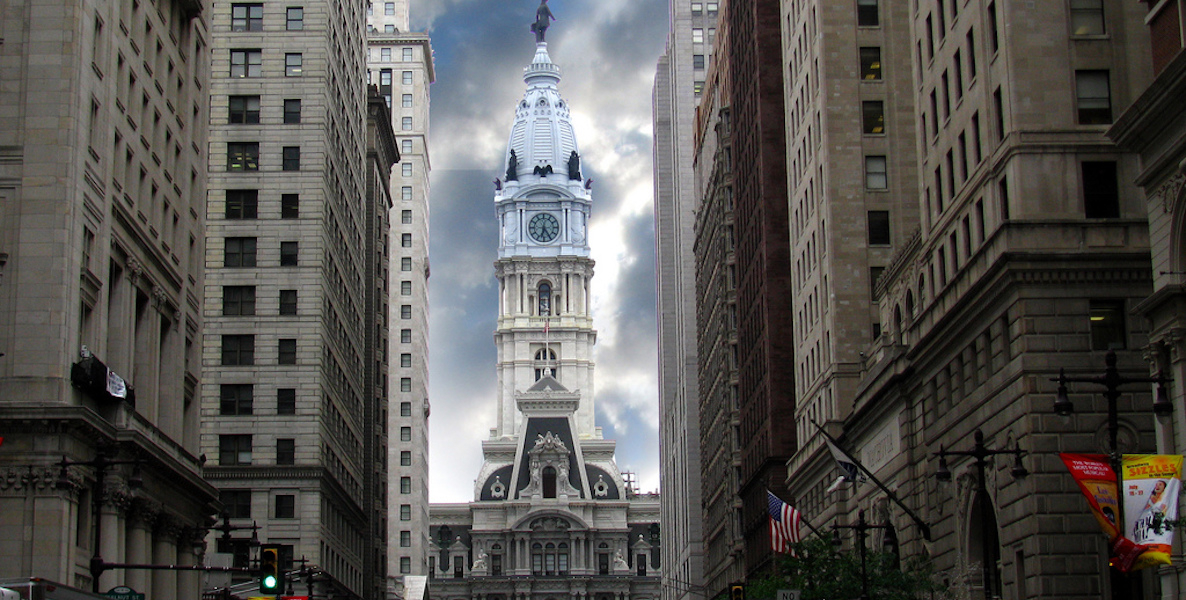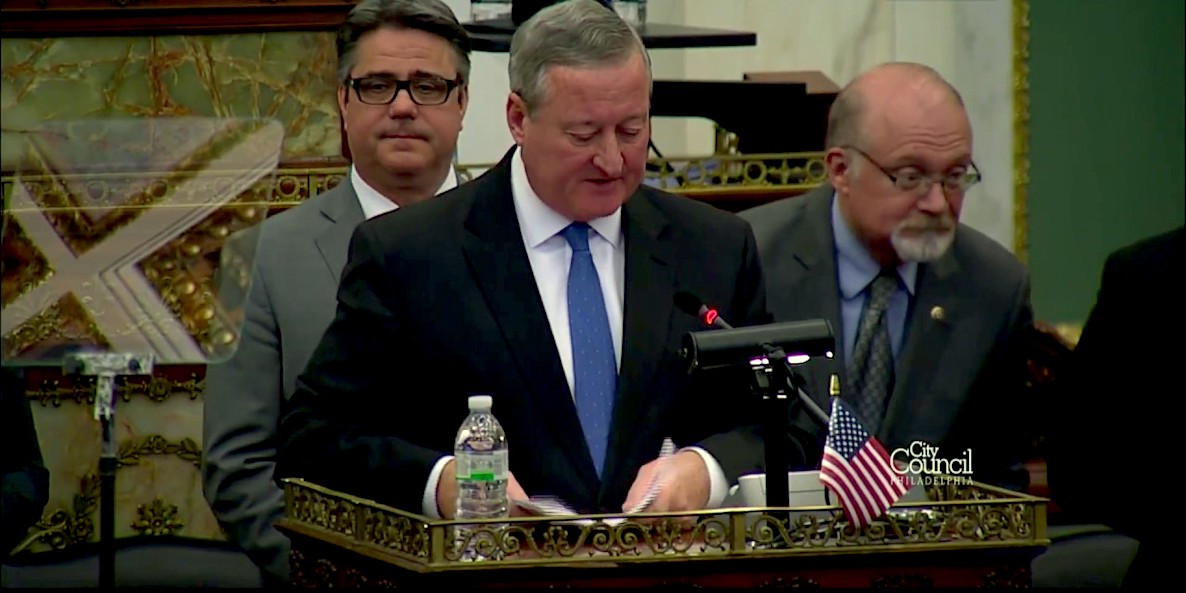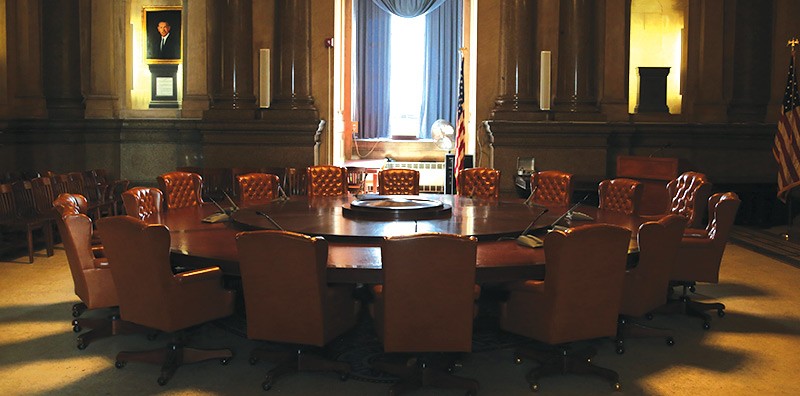The art of political spin has been around forever, from the ancient Greeks who crafted rhetoric to enflame the masses, to Woodrow Wilson’s wartime propaganda arm of the federal government. But lately it seems that spin—the deliberate crafting of words for purely political gain—is all we have. Sometimes it feels like our public life is little more than a set of competing messages, all meant to manipulate.

Prefer the audio version of this story? Listen to this article on CitizenCast below:

Yes, it’s gotten worse because we have a president who demonstrably, brazenly lies and who seemingly has no core convictions, but, honestly, our epidemic of spin predated Trump and knows no party or ideology. Which brings us to our own Jim Kenney, who went on 6ABC’s public affairs show, Inside Story, last Sunday, hyping his $5 billion spendapalooza of a proposed budget, a whopping 25 percent increase over the $3.9 billion budget he inherited. “If a candidate is running primarily on repealing the soda tax,” Kenney said, “you’re also repealing pre-K and you’re also running on repealing rebuild.”
It was, politically speaking, a smart construction; Kenney knows that both his primary challengers, Alan Butkovitz and Tony Williams, oppose the tax but support the programs it is meant to fund. But what came next confirmed that this was also Kenney flexing his political spin muscles.
“What if they say they’ll find the money somewhere else?” asked host Tamala Edwards, referring to the mayor’s challengers.
Kenney smiled a knowing smile. “This is my 29th budget,” he said. “There’s no extra $80 million laying around the budget. So these folks who are telling you they can find it in efficiencies and this or that, they’re just pulling the wool over your eyes.”
What makes this exchange an example of cynical spin? Well, those folks Kenney claims are telling you they can replace the soda tax by finding budgetary efficiencies? He was one of them. Yet here he is, banking on voters’ short attention span in pursuit of his own political ends.
Those folks Kenney claims are telling you they can replace the soda tax by finding budgetary efficiencies? He was one of them. Yet here he is, banking on voters’ short attention span in pursuit of his own political ends.
Here’s the background: When Kenney ran for mayor in 2015, many of us were excited by his calls for pre-K and rebuilding rec centers and parks. His plan to pay for those programs called for no new taxes. Instead, he was going to squeeze out of the system $80 million—yes, he even put a number to it—by adopting the practice of zero-based budgeting.
What is that? It’s an innovative accounting system that first came to light under President Jimmy Carter back in the ‘70s. Instead of having department heads submit their usual request for a percentage raise in their budgets each year, zero-based budgeting requires them to first define their core mission and then start their budget at zero and build it—until they meet that mission.
Zero-based budgeting is a reform that is gaining traction around the country. Some 35 municipalities practice some version of it, and, last year, a Republican Congressman from Florida proposed a federal zero-based budgeting bill. When he was a candidate, Kenney committed to it after seeking out the advice of Josh Shapiro, who, prior to becoming our Attorney General, zero-based away a $10 million budget hole and $49 million structural deficit in his first year as Montgomery County Commission Chairman. By forcing stewards of public dollars each year to justify all expenses to meet their mission, zero-based budgeting in Montgomery County and across the nation has exposed bloated spending by identifying expenditures that both rise in response to political debts and that are the inevitable residue of mission creep over time.
![]()
Surprise, surprise: Kenney’s zero-based budgeting plan fell by the wayside once he was given the keys to City Hall. Instead, we got yet more taxes in the nation’s most taxed-city this side of Bridgeport, Connecticut.
And now, when it’s politically convenient, Kenney contradicts his former self by arguing that there is no bloat, no savings to be had whatsoever, in his $5 billion budget. You tell me: What are the chances that this budget is that pristine and tight, keeping in mind that the same administration making that claim took months and months to find $33 million in missing revenue on its books, and, according to the Controller, committed $924 million in accounting errors?
Kenney’s spin machine didn’t stop there. In response to Edwards’ insightful questions on the Channel 6 interview, (full disclosure: I was a guest panelist on the show), Kenney struggled to define a unifying vision for Philadelphia outside this one response: “Education,” he said, noting that his budget calls for $1.2 billion in education funding over six years. “The only way out of poverty is education.”
Sounds good, right? Kenney deserves credit for taking back accountability over our schools and for thinking long term by investing in education. But is it true—as might appear on the face—that the only way out of poverty is education?
“Education is a supply-side policy,” writes economist Jared Bernstein. “It improves the quality of workers, not the quality or the quantity of jobs. A danger of overreliance on education in the poverty debate is that skilled workers end up all dressed up with nowhere nice to go.”
A body of research would suggest that it is not. “Education is a supply-side policy,” writes economist Jared Bernstein, Joe Biden’s longtime chief economic adviser. “It improves the quality of workers, not the quality or the quantity of jobs. A danger of overreliance on education in the poverty debate is that skilled workers end up all dressed up with nowhere nice to go.”
Bernstein and many other experts maintain that, just as there are multiple determinants of poverty, there needs to be multiple responses. Education is key, yes, but so is intervention relative to race, family structure, economic growth and structural inequality. He cites research showing that, between 1969 and 2000, improved education did indeed lower family poverty by almost 4 percent points; at the same time, though, economic growth lowered poverty by 5.7 percent.
![]()
In 2015, Matt Bruenig—a socialist policy analyst—demonstrated why in a report headlined Why Education Does Not Fix Poverty. Bruenig proves that, since the early ‘90s, we did indeed raise the nation’s educational level without seeing a corresponding downturn in poverty. “Handing out more high school and college diplomas doesn’t magically create more good-paying jobs,” he writes. “When more credentials are chasing the same number of decent jobs, what you get is credential inflation: Jobs that used to require a high school degree now require a college degree; jobs that used to require an Associate degree now require a Bachelor’s degree, and so on…Second, having more education does not necessarily increase people’s productive capacity…Third, poverty is really about non-working people: children, elderly, disabled, students, and the unemployed. The big things that cause poverty for adults over the age of 25 in a low-welfare capitalist society—old age, disability, unemployment, having children—do not go away just because you have a better degree.”
![]()
In other words, as we all know on some level, our challenges are more complicated than Mayor Kenney’s one-liners can adequately address. This is why we need a mayoral campaign, because we need a real conversation about our seemingly intractable problems. Because bromides like “there is no extra $80 million laying around the budget” and “the only way out of poverty is education” just don’t cut it.
Kenney calls his $5 billion budget “prudent.” “We think we’re moving forward in the right direction,” he said on Channel 6. “Unemployment is down, the population is up, development is up, we have a solid fund balance.”
Seems like, if not spin, then a rather selective list of reelection metrics, no? No mention of the unchanged, worst-in-the-nation poverty rate, or all our suffocating taxes, or our anemic job growth, or the exploding murder rate, up 3 percent so far this year, after jumps of 8 and 15 percent, respectively, the last two years. Shouldn’t leadership actually confront our challenges, rather than try and spin them away?
Photo via YouTube








